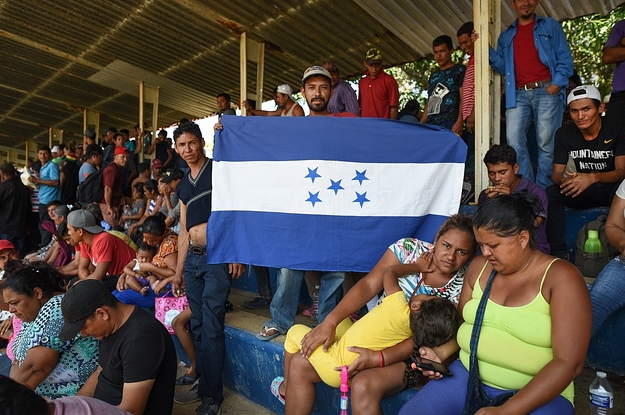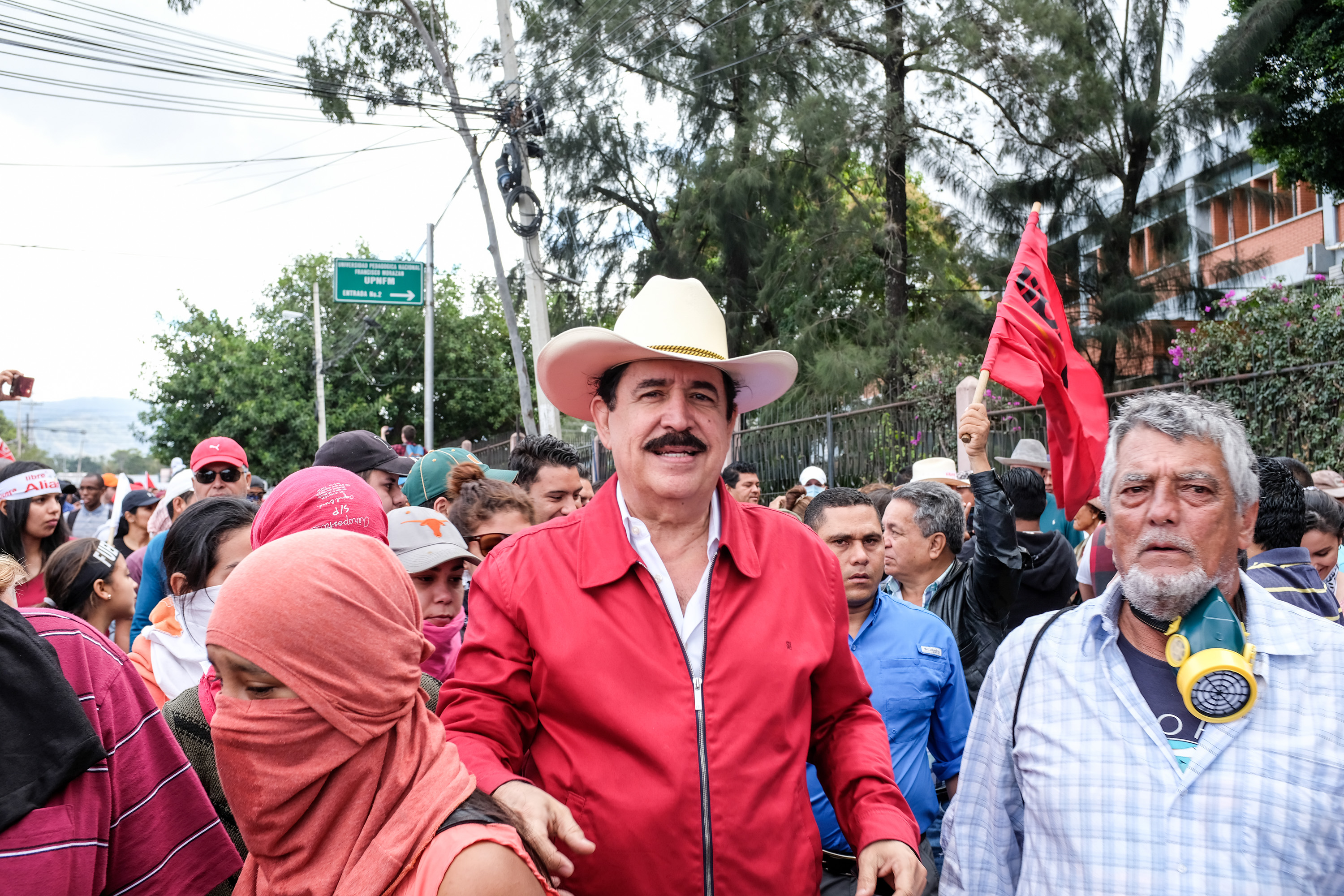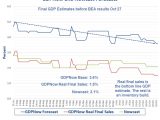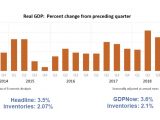
Inside the Corruption and Repression Forcing Hondurans to Flee to the US
October 26, 2018Nineteen-year-old taxi driver Diego is not interested in politics. But his hometown of El Progreso—a transit hub in central Honduras, where everyone seems to have a friend or relative who has “gone north” to the US—has long been a hotbed of popular resistance. In 1954, workers here launched a 69-day strike that challenged the United Fruit Company and briefly brought the country to a political and economic standstill.
In November 2017, it was allegations of fraud in the country’s recent presidential election that drew demonstrators to the streets. On one of those days, Diego dropped a passenger near where anti-government protests were slated to take place. He had been driving his taxi all morning and decided to take a break and check out the action nearby. Moments after he got out of his car, Diego found himself in the path of a phalanx of Honduran security forces marching through a cloud of tear gas. Before he could process what was going on, they began firing live rounds into the crowd. A bullet struck Diego’s lower leg as he ran away. (VICE has changed names and certain details to protect the identities of Diego and his family.)
Diego’s older brother Raúl was participating in the protests, and took Diego to the hospital, where they found medical staff overwhelmed by an influx of people in need of emergency care. As they waited outside, a police patrol arrived and began accusing injured protestors of being gang members. “They tried to drag us into their cars and threatened to take the phones of anyone who tried to film them,” explained Raúl. It was only after doctors intervened that the police relented. “I don’t think they would have taken us to jail. I think we would have disappeared,” he continued. “That’s how they silence you.”
“They,” in this case, are the security forces that answer to Honduran President Juan Orlando Hernández, an impeccably coiffed Latin American politician straight out of central casting. His pro-business, World Bank and International Monetary Fund–approved vision for Honduras, combined with his preference for a militarized approach to the war on drugs, has made him a favorite within certain US policy circles. The country has received more than $70 million in security assistance from the US since his election in 2014, according to data collected by the Center for International Policy. When President Donald Trump’s current chief of staff, John Kelly, served as head of the US military’s Southern Command during the Obama administration, he praised Hernández for his record on human rights, anti-corruption, and tackling drug trafficking.
Human rights and anti-corruption groups have documented just the opposite. The organization Human Rights Watch, for example, describes Honduras under Hernández as a place where “impunity for crime and human rights abuses is the norm.” A two-year investigation by watchdog group Global Witness concluded that Honduras is the deadliest country in the world for environmental activists, writing in 2017, “Nowhere are you more likely to be killed for standing up to companies that grab land and trash the environment than in Honduras.” Even the normally measured Carnegie Endowment for International Peace has gone so far as to label Honduras a country where “corruption is the operating system” and “repression is carefully targeted for maximum psychological effect.”
Several members of Hernández’s National Party, including the son of his like-minded predecessor, have been implicated in drug trafficking. Last year, a leader of the Cachiros, a drug cartel that specialized in transporting Colombian cocaine through Honduras, testified in a New York court that Hernández’s brother was directly involved in their operations.
That deadly political climate has contributed to anti-government protests, as well as the decision by at least 350,000 Hondurans in the last ten years—including at least 52,000 unaccompanied minors in the last five—to make the perilous journey through Guatemala and Mexico in order to reach the US. Those numbers are conservative estimates provided to VICE by Stephanie Leutert, the director of the Mexico Security Initiative at the University of Texas, who tracks migration trends in the region.
Among those who have left are Hondurans in the caravan of a few thousand migrants currently making their way through Mexico to the US border, enduring brutal conditions and suffering under rain and hot sun with little protection. “It’s even worse in Honduras,” one mother of four in the caravan told VICE News earlier this week.
Much of the narrative about why so many Hondurans risk everything to migrate focuses on astronomical homicide rates and gang violence perpetrated by groups like Mara Salvatrucha, known as MS-13, and a similar gang called Barrio 18. While those arriving in the US are indeed often fleeing gang activity, and young people deported back to Honduras do risk forced recruitment or becoming victims, gang violence is only one part of the broader system that drives people to leave their homes.
Interviews in Honduras with close to 40 human rights and environmental activists, lawyers, opposition leaders, citizens in hiding, and friends and family of those who have disappeared or been assassinated tell a much more complicated, disquieting story of why people leave. In the last nine years, Honduras has morphed into something that defies neat categorization: a narco-kleptocracy of sorts, operating under the guise of privatization and deregulation, where politicians, business elites, and organized crime oversee a system of governance predicated on corruption, violence, and impunity in order to enrich themselves and terrorize their opponents.
And at almost every turn, this system has been enabled and at times encouraged by the US government.

Hernández’s reelection all but guarantees the system of looting and self-enrichment will continue, with business interests and organized crime working with the government to threaten, and even kill, those who stand in their way.
When Berta Cáceres was assassinated in 2016, her murder drew worldwide condemnation, and independent investigators alleged that her assassination was planned and executed by individuals with ties to the Honduran military and DESA, the private company whose hydro-electric projects Cáceres had spent years protesting. Two and half years after her murder, the men arrested in connection with her murder are yet to face trial.
But it is not just movement leaders like Cáceres who are targeted for assassination. Since the coup in 2009, human rights organizations have documented over 130 assassinations of environmental activists.
Days after Cáceres was murdered, Nelson Garcia, who was also a member of Cáceres’s organization, COPINH, was killed leaving his home. According to Garcia’s mother, when she arrived at the crime scene one of the police officers asked her if she knew her son was involved with COPINH. She nodded in the affirmative. “Then you must know where the death is coming from and why,” the police officer continued, before going back inside his air-conditioned car to listen to music.
For those who wanted him dead, however, killing Garcia was not enough. His wife and children were constantly threatened by gang members after his murder and have successfully sought asylum in the US, making them a relative rarity. Despite the systemic violence and government oppression, Honduras ranks fourth-highest in denial rates for asylum seekers to the US, with 78 percent of claims rejected.
Garcia’s family in Honduras still faces harassment from those determined to send a message to future activists, including threats over the phone and at least one case in which someone attempted to shoot his uncle while he was tending his fields.
In February, I met with peasants, or campesinos, in the Bajo Aguán region, where entire communities are living in squalor after they were violently displaced by World Bank–supported development projects devoted to agribusiness. Community members took turns telling me about friends and family who have been murdered or disappeared. Sometimes it is Honduran security forces firing tear gas and live rounds into their encampments situated deep within the jungle of palm oil plantations. Other times, its paramilitary groups and gang members hired to do their bidding.
“If they are going to kill me because of it, fine, they can kill me. I have lived a life of suffering, not joy. I haven’t felt joy,” said Sofia Baquedano, an elderly woman who is a part of the campesino resistance in a village called Panama. Baquedano and her comrades are protesting an African palm oil plantation they say Dinant came to control via an illegal land-grab. “No medicine, no food, no roof over our heads. The only thing that Juan Orlando [Hernández] gives us is gas and bullets,” Baquedano said, pointing to the military compound only a few hundred meters in the distance, which is embedded within the Dinant palm oil plantation. When I approached that Honduran military installation to request an interview with whomever was authorized to speak, one soldier quipped to another that perhaps my colleague and I “wanted lead.” Subsequent requests to interview the Honduran military or government officials went unanswered.
According to Panama community members, trying to reclaim their land through occupation is the only option at their disposal. Their organization is named after Gregorio Chavez, a local preacher who denounced Dinant corporation before he was kidnapped, tortured, and brutally murdered. Legal challenges have either gone nowhere or been ignored.
Another community in the Bajo Aguán, called Trinidad, made some progress taking their fight to the courts, but as soon as decisions started going their way, their lawyer, Antonio Trejo Cabrera, was assassinated as he was leaving a wedding in Tegucigalpa. “They can take away our lawyers but they can’t take away our people,” said Walter Calcemo, one of the campesinos trying to reclaim land given to agribusiness in the Bajo Aguán. “We are a stone in their shoe.”
Yet the reality is that not everyone shares the same defiance as Baquedano and Calcemo, who seem prepared to continue their fight against the government and its business allies indefinitely. As members of their communities continue to disappear or turn up dead, many young people have decided that “going north” to the US, the very country that lends an imprimatur of legitimacy to the system that oppresses them, is the only viable path to a different future.
“There used to be a lot more of us here,” Calcemo lamented, pointing to the tents and benches that comprise what is left of their encampment. “Many of the young people are gone. There is nothing left here for them.”
Peter Tinti is a journalist focused on conflict, human rights, and organized crime.


